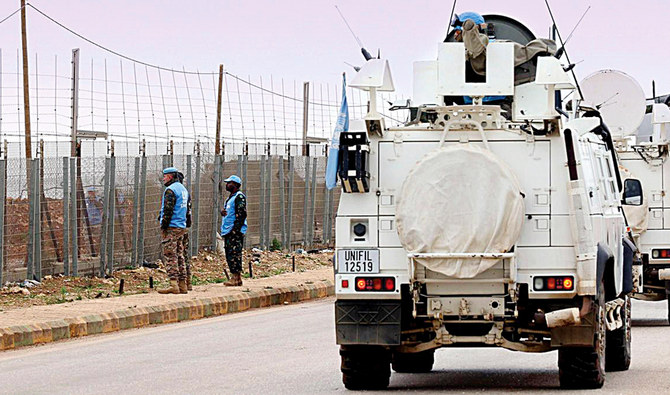BEIRUT: The Lebanese government has stepped up efforts to crack down on smuggling operations along its border with Syria which ministers claim are posing major security and economic threats to the country.
Despite Lebanese security forces making 449 arrests and thwarting 336 attempts to smuggle goods and people over a network of crossings, illegal movements to evade customs continue to impact on the Lebanese pound. And ministers have been told that more than 80 percent of illicit trade is taking place at legitimate border crossings between the two countries.
As well as the smuggling of people and goods and the infiltration of terrorists into Lebanese territory, officials have also been battling to prevent Hezbollah fighters from illegally crossing into Syria and back. Various moves have taken place over recent weeks to beef up border controls.
A UN delegation, presided over by the British Ministry of Defense’s senior adviser on the Middle East, Lt. Gen. Sir John Lorimer, inspected Lebanon’s southern borders with Israel and held meetings with Lebanese political and military officials to discuss the expansion of the eastern borders control area and the building, with UK assistance, of more observation towers.
Separately, Lebanese Defense Minister Elias Bou Saab visited the northern and eastern borders after the government put him in charge of finding a solution to illegal border crossings and smuggling operations.
And the US and UK ambassadors to Lebanon, Elizabeth Richard and Chris Rampling respectively, visited the eastern borders accompanied by the Lebanese Army Chief Joseph Aoun to oversee border control operations in the lead-up to the linking of observation towers equipped with satellite technology to assist with army monitoring work.
Lebanese Minister of Interior Raya Al-Hassan and Bou Saab briefed the country’s Parliamentary Committee for Administration and Justice on measures being taken to deal with illegal border activities.
Bou Saab said the northern border with Syria was 100 km long, while the eastern border stretched for 210 km, adding that the Lebanese Army had thwarted 336 smuggling attempts and arrested 449 smugglers, of which 290 were Lebanese, 145 Syrians, seven Palestinians and seven of other nationalities.
Head of the committee, Georges Adwan, said: “There are dozens of illegal crossings that represent an important threat. Customs evasion through illegal crossing represents 10 percent but the larger portion of evasion takes place through legitimate crossings, with 80 percent or more.
“Some smugglers were arrested for two months before they were released and went back to their smuggling operations.”
Addressing the committee, Bou Saab said: “There are 10 to 15 illegal crossings that were closed by the army. However, smugglers opened new crossing points about 50 meters away the next day. Without an actual demarcation of the borders, we cannot say that we control 100 percent of the borders. Vegetables and fruits are being smuggled from Syria, which is harming Lebanese farmers.”
Economist Ghazi Wazni said: “The Syrian pound has significantly lost its value. Smuggled goods are replaced by foreign currencies that go to Syria.” Bou Saab gave an example of how illegal trades took place.
“A Syrian truck arrives at the northern borders of Nahr Al-Kabir River where it unloads onto smaller trucks and motorcycles. They cross the border within half-an-hour using a wooden bridge placed above the river. We remove such bridges, only to find them again at a different location.”
The Lebanese Army has 200 border posts, of which 74 contain advanced towers provided mainly by the UK but also the US, Germany and Canada.
“There are pedestrian crossings to smuggle individuals and terrorists. They were also used to smuggle weapons from Lebanon to Syria during the war,” added Bou Saab. “There are goods that cross the border with a customs declaration.”
Lebanese MP, George Okais, told Arab News, that Bou Saab had “contacted the relevant parties in Syria to close some illegal borders with dirt” in a bid to stop people smuggling which represented “a dangerous threat.”


























